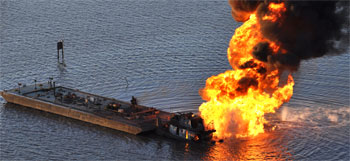A towboat captain was fatally injured when his vessel ran aground on a gas pipeline in Louisiana waters and burst into flames.
The accident happened as the 47-foot Shanon E. Settoon, was underway with a tank barge in Bayou Perot, about 30 miles south of New Orleans, on March 12. The towboat struck a submerged liquid petroleum gas pipeline at 1800.
Chad James Breaux Sr., 46, was badly burned and died a month later in a Baton Rouge, La., hospital.
Shanon E. Settoon was pushing the 154-foot barge, SMI 572, which contained 2,215 barrels of crude oil. The towboat was carrying about 1,000 gallons of diesel fuel. Upon impact, the pipeline was aflame, with the fire quickly engulfing the towboat, which belonged to Settoon Towing of Pierre Part, La.
“All crewmembers were able to exit the tug,” the U.S. Coast Guard said in a press release. “The captain reportedly suffered second- and third-degree burns.”
Breaux was originally taken to West Jefferson Medical Center, where he was treated before being transferred to Baton Rouge General Hospital’s burn unit. He died April 10, according to an obituary.
Coast Guard spokesman Ensign Tanner Stiehl, of Marine Safety Unit New Orleans, confirmed that there were four crewmembers aboard and that two were uninjured. One other crewmember was injured in the blast but survived.
The accident occurred in state waters. Stiehl could not comment on the presence of aids to navigation in the area. The Coast Guard responded with an MH-65 Dolphin helicopter from Coast Guard Air Station New Orleans and a 24-foot special purpose shallow watercraft from Coast Guard Station Grand Isle.
The Coast Guard said the pipeline, which belongs to Chevron, was shut down on the evening of the accident. Oil spill response organization ES&H of Houma, La., responded and mobilized over 13,000 feet of containment boom, eight boats and a Marco skimmer.
On March 14 personnel from T&T Salvage, of Houston, arrived aboard the spud barge Todd Michael and began a cooling operation on the barge while the tug fire was being extinguished. That afternoon T&T Salvage separated the barge from the tug wreckage. The barge was taken to a secure location for lightering. The lightering operation was completed on March 15. The integrity of the barge was never compromised. No pollution from the barge was reported.
While the residual liquid petroleum in the pipeline was burned off by a controlled process of flaring, the Coast Guard placed flight restrictions near the accident site at below 5,000 feet and a safety circle of a mile radius.
By March 19, purging operations of the pipeline were completed and the Coast Guard determined that the threat of fire or explosion no longer existed. No oil was spilled as a result of the accident and no impacts to wildlife were reported. However, state agencies will continue to monitor the area for any environmental impact as they develop a salvage plan to remove the tug wreckage.
In recent years, Coastal and Marine Operators (CAMO) has urged Gulf mariners to take a series of precautions to avoid crashing into or running aground on pipelines and other underwater petroleum-industry infrastructure. Vessel operators are instructed to identify the location of pipelines in voyage planning, be careful to use current charts and the Coast Guard’s Notice to Mariners and consider draft and tides.
“Ensure your vessel’s draft is appropriate for the entire area you plan to navigate,” a CAMO safety brochure reads. “Confirm that all known hazards are identified with visible markers … including pipeline crossings, obstructions (and) shallow or exposed pipelines.”
Bill Aldridge, manager of business development for GulfSafe, a Houston company dedicated to protecting pipeline infrastructure, said because the Shanon E. Settoon accident occurred in state waters, GulfSafe was not contacted by the vessel’s operator. Aldridge said that if a call was made, it would have been to LA One Call, a similar safety company that covers Louisiana state waters.
LA One Call and Settoon Towing did not respond to calls from Professional Mariner seeking comment. A spokesman for T&T Salvage declined to comment on the response.
The Coast Guard said the accident remains under investigation.
CAMO’s website instructs mariners plying state waters to dial 811. Between 1987 and 2007, there were 118 pipeline strikes in the region, causing a total of 25 fatalities and $100 million in property damage, CAMO said.
Breaux, of Houma, had been a boat captain for about 20 years, his obituary said. He is survived by five daughters and four sons.

